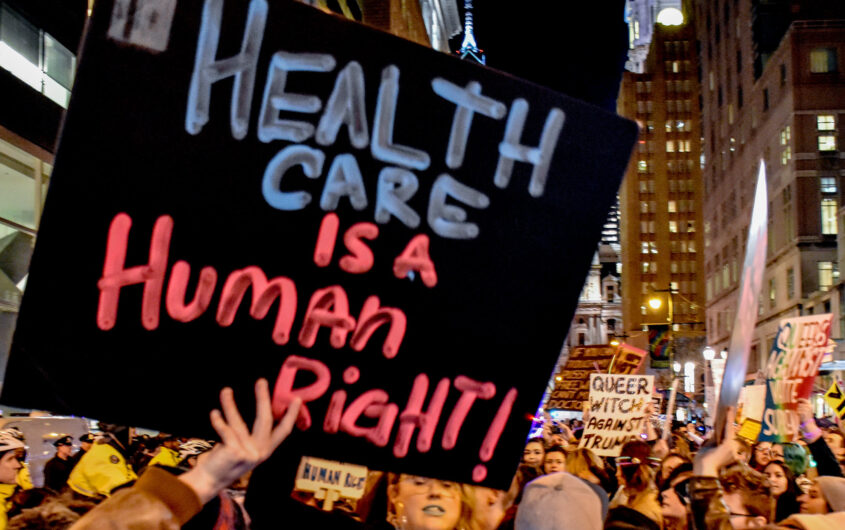
Joe Piette via Flickr
The Struggle for Equitable Healthcare

Thao Nguyen
LesMigraS/Lesbian Counseling Center Berlin e.V.
Thao Nguyen studied social sciences at the Humboldt-University in Berlin. In the last several years she has been active in various civil society initiatives and intersectional migrant organizations. She is a political educator and currently an anti-violence and anti-discrimination consultant for Queer People of Color who are affected by multiple discrimination. Her thematic focus lies in the field of addressing racism, queer feminism, classism and intersectionality.

Whitney Morris-Lange
Indiana Youth Group (IYG)
After more than a decade of teaching in Berlin, Germany, Whitney Morris-Lange made the decision to return to her hometown of Indianapolis in October 2021, to champion LGBTQ+ causes in the Midwest. Despite her roots in education, she embraced her passion for activism. Her diverse experiences in education, social work, and leadership forged a spirit essential for this new path, and her appreciation for progress propelled her forward. In January 2022, she eagerly embraced the opportunity to volunteer at Indiana Youth Group (IYG), the nation’s oldest continually operating LGBTQ+ youth center. There, she found herself captivated by IYG’s mission to empower young individuals, eagerly anticipating the perfect opportunity to formally join the team. Since October 2022 Whitney has been working as IYG’s Donor Relations Manager.
The Rights of Transgender and Non-Binary People in Germany and the United States
As the struggle for equitable healthcare for transgender and non-binary individuals persists globally, a comparative analysis of the situations in Germany and the United States reveals stark contrasts in approaches, challenges, and progress. While both countries grapple with systemic barriers and discrimination within their healthcare systems, nuanced differences in legal frameworks, cultural contexts, and healthcare infrastructure shape the experiences of transgender and non-binary individuals seeking care. This article examines the rights of transgender and non-binary people within the German and U.S. healthcare systems revealing not only shortcomings in policy and practice but also the urgent need for transformative change.
Germany
Accessing healthcare for transgender and non-binary individuals in Germany is akin to navigating a minefield of obstacles, from a severe shortage of knowledgeable healthcare providers to financial barriers and pervasive discrimination. The Bundesverband Trans* recently stated that human rights-based healthcare has still not been implemented in Germany. Concretely, human rights-based healthcare means protection against discrimination in all areas of the healthcare system as well as secure, universal access to transition-specific services and the guarantee of non-pathologizing cost coverage. The term ‘non-pathologizing’ refers to the approach of recognizing and affirming a person’s gender identity without viewing it as a medical disorder. This perspective emphasizes the validity of transgender identities as part of the natural diversity of human experience, rather than as conditions needing medical correction.
In Germany, transition-specific healthcare is still characterized by a pathologizing understanding of transsexuality. Even though the International Classification of Diseases released by the World Health Organization revised the pathologizing classifications in its most recent version (ICD-11) and replaced it with the diagnosis “gender incongruence” (i.e., the permanent lack of correspondence between assigned gender and gender identity). However, it may be a long time before the ICD-11 is introduced in Germany. A specific date has not yet been set. Unfortunately, a de-pathologizing approach, which is expressed in the ICD-11 guideline, cannot be found in the current version of German guidelines for health insurance companies. Until now, in order to be approved by statutory health insurance to cover the costs of gender reassignment measures, transgender people are forced into an involuntary psychotherapy relationship. But the psychotherapeutic undersupply makes it difficult to even find a therapist. On the other hand, the psychological symptoms of transgender people are often the result of experiences of discrimination and minority stress.[1] From a scientific perspective, psychological stability is often only achieved through transition-specific measures.[2]
Moreover, non-binary and intersex people are also mostly excluded from reimbursements of gender-affirming costs. With the introduction of the gender entry “diverse” in 2018, the existence of more than two genders was legally recognized in Germany. Nevertheless, non-binary and intersex people are excluded from having the gender-affirming costs covered. Insurance assessment instructions are based on strict criteria in which transsexuality is only defined in binary terms and described as a “desire to live and be recognized as a member of the opposite sex.” Non-binary and intersex people who want to transition medically can submit an application for cost coverage, but this is usually rejected by health insurance companies. The Federal Social Court ruled in favor of health insurance companies not to pay for gender reassignment surgery after a non-binary person had taken legal action against their health insurance company that refused to pay for their mastectomy in October 2023.
Furthermore, adolescent transgender minors are excluded from having gender-affirming costs covered since they are not included in the assessment of health insurance companies from the beginning. That leaves many minors waiting months or even years for gender-affirming treatments, exacerbating physical and mental health concerns in the process—in the worst case leading to suicides.
For transgender refugees, the crucial question is whether there is any access to standard healthcare and transition-specific care. Asylum seekers who receive basic benefits are usually only entitled to benefits to the extent of statutory health insurance after a stay in Germany of at least eighteen months. Before that, they only receive medical services in the event of acute illnesses, pain, or pregnancy. In most cases, transition-specific healthcare is not covered during this period. The exception is that hormone treatment that has already begun can be continued. Transitional psychotherapy does not fall under “emergency treatment” and can therefore only be used after eighteen months. For transgender refugees, this means that a transition sometimes must be postponed, interrupted, or carried out independently without insurance. In addition, language barriers are a major hurdle in contact with all healthcare representatives.
A huge milestone for transgender people was the passage of the Self-Determination Act by the German federal parliament on April 12, 2024. From November 2024 onwards, it will be possible for individuals to change their gender marker and first name on identifying documents by self-disclosure to the registry office. The fact that it will soon be possible to change one’s gender marker without having to endure a costly examination beforehand is a historic achievement for the equal recognition of gender diversity. In the AGI program “Building LGBTQ+ Communities in Germany and the United States” meeting with Member of the Bundestag Nyke Slawik (Alliance 90/The Greens), one of two openly transgender people in the German parliament, she critiqued that the Self-Determination Act does not contain any regulations on gender reassignment medical measures due to opposition from other parties. The current medical regulations and guidelines (including insurance coverage) will continue to apply to gender reassignment medical measures. An expert committee will evaluate these regulations and guidelines in summer 2024 hoping to change them in the direction of gender-affirming healthcare.
In addition to transition-specific areas of healthcare, transgender and non-binary people need access to regular healthcare. Transgender and non-binary people are a particularly vulnerable population who are frequently discriminated against. Due to (fear of) experiences of discrimination, their risk of developing stress-related psychological and physical symptoms is increased. Transgender people have an increased need for medical care compared to the cisgender population due to experiences of discrimination and the resulting illnesses. At the same time, healthcare is an area of life in which transgender and non-binary people particularly often experience discrimination. Reports of misgendering, disrespect, and denial of care are distressingly common, leading many to forgo necessary medical treatment rather than endure further humiliation and trauma.
Due to nominal coverage by statutory health insurance, the financial burden of gender-affirming procedures falls disproportionately on transgender and non-binary individuals. Disparities in coverage criteria and reimbursement processes further exacerbate socioeconomic inequalities, effectively denying access to care for those unable to afford out-of-pocket expenses. All these obstacles make access to gender reassignment measures more difficult and delayed, if not completely impossible, for many transgender and non-binary people.
United States
In the United States, the landscape of transgender and non-binary healthcare rights is marked by a complex interplay of legal, social, and healthcare factors. While progress has been made in certain areas, significant challenges persist, mirroring some of the issues faced in Germany but within a distinct context.
Unlike Germany’s recent milestone with the Self-Determination Act, the legal landscape in the United States regarding gender marker and name changes varies widely by state. The United States’ federalist system results in a varied legal landscape for gender marker and name changes, as states have significant autonomy over these matters. Some states, like California and New York, offer streamlined processes like Germany, without requiring extensive medical or legal documentation, aiming to ease the transition for individuals. In contrast, other states impose stringent requirements, such as medical documentation or court orders, creating logistical and psychological barriers. This inconsistency leads to significant disparities in how individuals can align their legal documents with their gender identity, depending on their state of residence, highlighting the tension between state laws and national mandates.
While both Germany and the United States navigate unique legal frameworks, cultural contexts, and healthcare infrastructures, the shared struggle for equitable healthcare for transgender and non-binary individuals underscores the urgent need for transformative change.
Accessing healthcare for transgender and non-binary individuals in the United States remains fraught with challenges, including a shortage of knowledgeable healthcare providers, especially in rural areas, and significant financial barriers. While the Affordable Care Act (ACA) prohibits discrimination based on gender identity in healthcare settings, enforcement and implementation vary, leading to inconsistent experiences for transgender and non-binary patients across different healthcare facilities and providers.
Insurance coverage for gender-affirming treatments and procedures varies widely among private insurers and Medicaid programs across states. While some insurers have expanded coverage for transition-related care in recent years, others continue to exclude or restrict coverage, leaving many transgender and non-binary individuals to navigate complex and often costly out-of-pocket expenses. The lack of uniformity in coverage criteria further exacerbates disparities in access to care.
Discrimination and stigma in healthcare settings remain pervasive challenges for transgender and non-binary individuals in the United States. Reports of misgendering, denial of care, and disrespectful treatment are common, leading many to avoid seeking necessary medical care altogether. The fear of discrimination, compounded by experiences of minority stress, contributes to heightened healthcare avoidance and delays in seeking gender-affirming care, further exacerbating health disparities within this population. The prevalence of hate crimes further underscores the severity of the situation. Out of 11,613 hate crimes in the United States in 2022, 2,858 hate crimes were committed against people based on gender, gender identity, sexual orientation, and multiple biases, highlighting the systemic violence and discrimination faced by these communities and its detrimental impact on their overall well-being.
Transgender and non-binary individuals from marginalized communities, including people of color, low-income individuals, and those with disabilities, face compounded barriers to accessing healthcare. Structural inequities, including racism, classism, and ableism, intersect with transphobia and discrimination to create unique challenges in navigating healthcare systems and obtaining culturally competent and affirming care. This denial of care starts early, as youth and young LGBTQ+ people who aim to access care face an immense flood of anti-affirming care from the get-go, encountering resistance and discrimination that can discourage them from seeking necessary medical support and affirming services throughout their lives.
According to the 2024 Trevor Report, 39 percent of LGBTQ+ young people seriously considered attempting suicide in the past year, with 46 percent of those identifying as transgender or non-binary. LGBTQ+ youth of color reported higher rates than their White peers. Additionally, 50 percent of LGBTQ+ young people who wanted mental healthcare in the past year were not able to access it. Despite the prevalence of anxiety, depression, and suicide risk among LGBTQ+ young people, half of them were not able to access the mental healthcare they desired. Among the small percentage of transgender and non-binary young people who received gender-affirming medical care, nearly 3 in 5 were worried about losing access to this care. Furthermore, among transgender and non-binary young people, 13 percent reported being on gender-affirming hormones, and 2 percent reported taking puberty blockers.
Despite ongoing challenges, grassroots advocacy efforts and legal advocacy organizations in the United States continue to push for policy reforms aimed at advancing the rights and healthcare access of transgender and non-binary individuals. From lobbying for inclusive healthcare policies to challenging discriminatory practices in court, these efforts are essential in driving systemic change and advancing equitable healthcare for all. However, these advocacy efforts face a daunting political climate. In 2023, over 500 pieces of legislation restricting the rights of LGBTQ+ people were introduced in state legislatures, and nearly as many bills have been introduced or remain under consideration thus far in 2024. These legislative attacks underline the critical need for continued and intensified advocacy to protect and advance the healthcare rights of LGBTQ+ individuals. While the United States has made strides in recognizing the rights of transgender and non-binary individuals, significant challenges to equitable healthcare remain. Addressing these challenges requires a multifaceted approach that includes legal reforms, increased access to knowledgeable and affirming healthcare providers, comprehensive insurance coverage, and targeted efforts to combat discrimination and stigma within healthcare settings.
Conclusion
In comparing the healthcare rights of transgender and non-binary individuals in Germany and the United States, it becomes evident that both countries grapple with systemic barriers and discrimination within their healthcare systems. Germany’s recent milestone with the Self-Determination Act represents a significant step forward in recognizing gender diversity and streamlining legal processes for gender marker changes. However, the pathologizing approach to transition-specific healthcare and exclusionary practices that disproportionately affect transgender and non-binary individuals continue to affect gender non-conforming individuals.
Similarly, the United States has made strides in recognizing the rights of transgender and non-binary individuals, with efforts to combat discrimination and expand access to gender-affirming care. Yet, significant barriers persist, particularly in insurance coverage, healthcare access, and combating discrimination within healthcare settings. The intersectional challenges faced by marginalized communities further compound these barriers, highlighting the need for comprehensive reforms and targeted efforts to address systemic inequities.
While both Germany and the United States navigate unique legal frameworks, cultural contexts, and healthcare infrastructures, the shared struggle for equitable healthcare for transgender and non-binary individuals underscores the urgent need for transformative change. Recognizing and addressing the systemic barriers, disparities, and discrimination within healthcare systems is essential to advancing the rights and well-being of transgender and non-binary individuals globally.
[1] Ilan H. Meyer, “Prejudice, social stress, and mental health in lesbian, gay, and bisexual populations. Conceptual issues and research evidence,” Psychological Bulletin 129 no. 5 (2003): 674–697.
[2] Mari Günther, Kirsten Teren, Gisela Wolf, Psychotherapeutische Arbeit mit trans* Personen Handbuch für die Gesundheitsversorgung (Munich: Reinhardt Verlag, 2020).
This article is part of the project “Building LGBTQ+ Communities in Germany and the United States: Past, Present, and Future” and is generously funded by the Transatlantik-Programm der Bundesrepublik Deutschland aus Mitteln des European Recovery Program (ERP) des Bundesministeriums für Wirtschaft und Klimaschutz(BMWK) (Transatlantic Program of the Federal Republic of Germany with Funds through the European Recovery Program (ERP) of the Federal Ministry for Economics and Climate Action (BMWK)).








